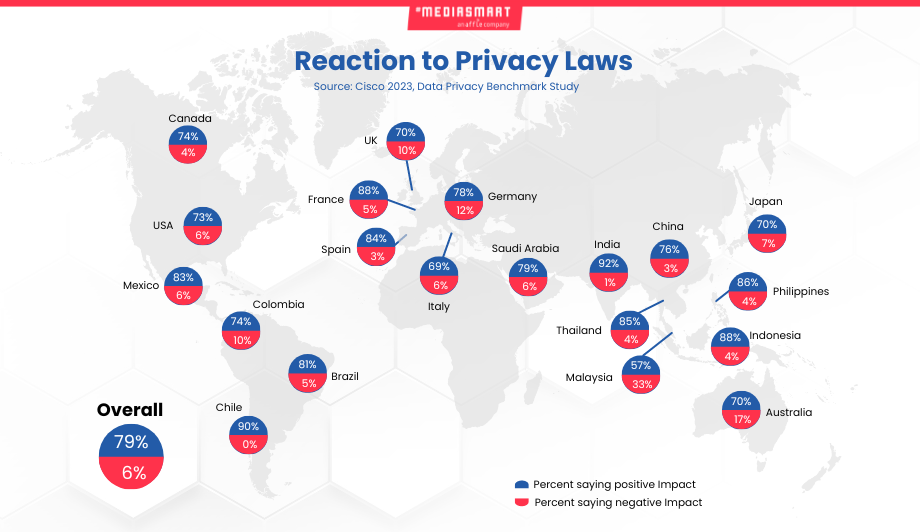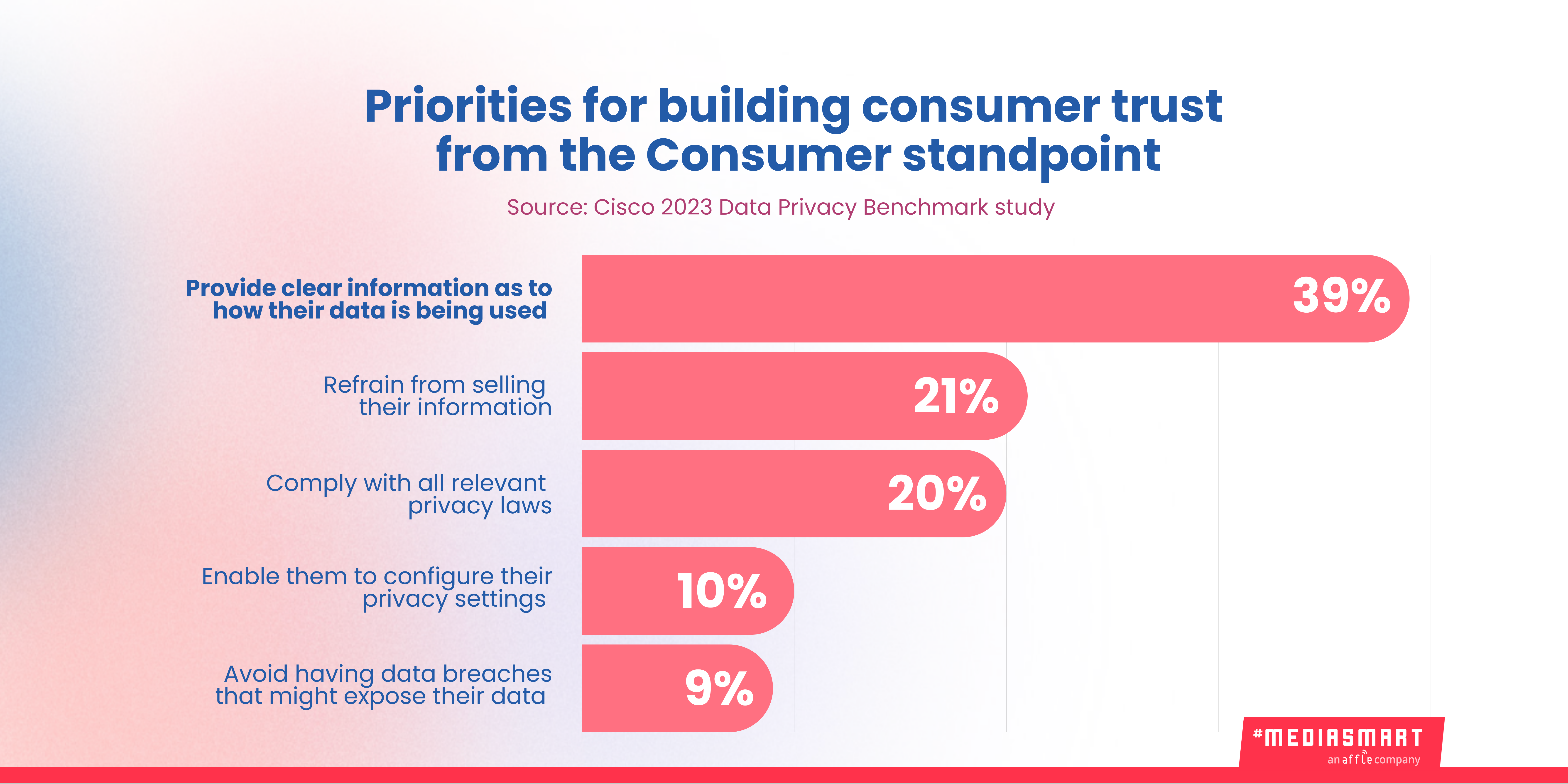Blog
Announcements, analysis and opinions on industry trends around the mobile programmatic world.

Subscribe now, and receive the latest programmatic content directly on your inbox!
Thank you for subscribing to our newsletter
Trust is the cornerstone of successful marketing. With the evolution of privacy regulations and the phasing out of native IDs and cookies, marketers face the challenge of building trust with their audience while delivering personalized experiences. Although first thoughts when mentioning Privacy in online data usually go to the European GDPR and the Californian CCPA, this challenge is global; with a staggering 71% of countries having Data Protection and Privacy Legislation, according to the United Nations Conference on Trade and Development. Additionally, it is interesting to note that the global reception of such laws is very positive, as reflected on this map from the Cisco 2023, Data Privacy Benchmark Study:

As showcased by AdExchanger, the future of Ad Tech is about consent, not cookies. Consent-based marketing has emerged as the ethical solution, but navigating this landscape requires the right technology partner. Let us delve into it.
Diving into the Challenge: Navigating Advertising in an ID-less and Cookie-Free World
In recent years, the marketing landscape has transformed dramatically. In this fast-paced industry, staying on top means navigating a maze of rules and interpretations. Some guidelines are broad and principle-based, while others are strict and rule-oriented, creating a challenge for marketers to discern the dos and don'ts. To complicate matters, different regulatory bodies often offer conflicting advice, leaving marketers in a state of uncertainty.
With regulations constantly evolving, especially in areas like the European Union, where technical GDPR standards merge with member state laws, digital marketers are not just innovators but also adaptability champions. There are competitive opportunities created by data privacy regulations. As highlighted in that compelling read by McKinsey, being agile is the name of the game, ensuring marketing strategies not only pack a punch but also align seamlessly with the ever-changing rules, making campaigns not just impactful but also ethically responsible.
Ultimately, the universally acknowledged truth is that consumers are increasingly concerned about their privacy, demanding transparency and respect for their preferences. Coming as no surprise, the Forbes Data Security Privacy trends for 2023 highlights that “62.3% of consumers don’t like it when social media sites, search engines, mobile apps, etc. take their personal, online and mobile location data and allow advertisers to use it to send them advertising”.
With native IDs and cookies becoming a thing of the past, advertisers find themselves in a bit of a pickle. Suddenly, reaching the right audience with the right ads isn't as simple as it used to be. As marketers struggle with delivering relevant and timely ads to their audience, how do you make your mark and connect with your audience effectively?
Implementing Consent-Based Strategies
On top of legal concerns, businesses should be hard-pressed to implement consent-based strategies. In terms of building trust, the Cisco 2023 Data Privacy Benchmark called to attention that providing clear information as to how data is used was a priority for 39% of the respondents. What is more, providing a positive privacy experience can increase the share of brand preference by 43%, according to the Privacy by design: the benefits of putting people in control study by Google and Ipsos.

Smart advertisers go about consent-based strategies using two approaches: information through context and alternative means of identification.
Contextual targeting, where the users’ inclination is learned by the content that is being consumed is indeed useful, especially when paired with measurement of viewability in real-time and clever technology such as Maximize User Awareness. Nevertheless, return on investment is hard to measure.
As an alternate option, marketers have taken to use privacy regulations-compliant, consent-based, IDs. The realm of ‘Universal IDs’, as the market has taken to calling them, is undergoing significant changes as the programmatic industry moves swiftly towards phasing out ‘legacy identifiers’ (native IDs).
Multiple service providers compete, asserting their superiority. Amidst the marketing noise, potential buyers find it challenging to navigate the options and make informed decisions. This is normal, given there are more than a hundred providers, according to the Identity Resolution H2 2023 report. Among them, you can find LiveRamp’s RampID or Zeotap’s ID+, both available through mediasmart, on top of our proprietary Audience mapping solution.
What sets mediasmart apart as the ideal technology partner is its commitment to privacy by design, its ability to identify across-screens, and to optimize and measure what works best for a particular campaign, in real-time.
In mediasmart, we recognize that privacy considerations should not be treated as an isolated feature, but rather integrated seamlessly into the overall design process; which has been part of our DNA since our inception. Our commitment to privacy by design, not only applies to our Audience solutions but also to every other piece of our stack.
Our solution not only ensures compliance with privacy regulations but also addresses the challenges of identification across screens, which has become more complex in this new digital era. By employing sophisticated cross-screen identification methods, mediasmart can deliver personalized and seamless user experiences. We can ensure marketing efforts remain effective, relevant, and cost-efficient even without relying on conventional tracking mechanisms.
In the absence of IDs and cookies, real-time optimization and measurement have become increasingly difficult but advertisers still want to analyze user interactions and preferences in real-time. By enabling cross-screen and cross-environment identification, mediasmart’s Audience mapping can interpret awareness and interaction data instantaneously. This allows marketers to keep identifying what works best for a particular campaign and adjust their strategies. Both automated and manual optimizations are possible using the mediasmart ID.
All in all, with a focus on ethical data usage, mediasmart empowers businesses to build trust with their audience while delivering impactful marketing and being able to measure its results.
Embracing Consent-Based Marketing with Audience Mapping by mediasmart
In the age of privacy concerns and evolving regulations, consent-based marketing is not just a choice but a necessity. By choosing the right technology partner, businesses can build trust, deliver personalized experiences, and create lasting connections with their audience.
With Audience Mapping by mediasmart, businesses can navigate the challenges of programmatic advertising without native IDs or cookies while prioritizing cross-screen user journeys and user privacy. Say goodbye to limitations: with Audience Mapping, your campaigns are not just ads; they are experiences tailored for real people. Let's revolutionize the way you advertise, one mapped audience at a time. Ready to transform your campaigns?
Contact us!
Sources:
- Privacy by design: the benefits of putting people in control, Google and Ipsos
- Data Security & Privacy Trends For 2023, Forbes
- The Future of Ad Tech Is About Consent, Not Cookies, AdExchanger
- Identity Resolution H2 2023, Insider Intelligence, eMarketer
- Localization of data privacy regulations creates competitive opportunities, Mckinsey
- Data Protection and Privacy Legislation Worldwide, UNCTAD
Topics: audience, privacy, audience engagement, Consent-marketing


